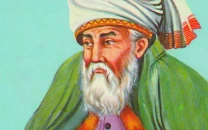Pakistan’s music economy: The stalemate
The Express Tribune takes a closer look at the factors behind the dearth of new music in the country.

Pakistan’s music economy: The stalemate
Since 2004, our industry has not produced a single new ‘star’. Even subsequent albums by the said artists, if they have appeared, have not captured the public imagination the way their earlier albums did.
Observers struggle to explain the current stall in our music industry. Surely we have not run out of talent? Some conjecture that consumer tastes have suddenly changed. Or that artists have lost the connection with their fans owing to the decline of public concerts. However, none of these theories hold up on closer scrutiny.
The reason lies elsewhere: In the way the music industry commercially operates. Over the last five years, the very institutions that were responsible for bringing good music to the Pakistani market have caused its downfall.
Let’s start with the record labels. There is only one active record label in Pakistan at present: Fire Records. With more than 50 artists under its belt, Fire Records enjoys a monopoly over the industry. The other big players of the industry (The Musik Records, EMI and LIPS Music — not counting Alif Records and Riot Records which only cater to individual artists) are currently dormant.
Fire Records offered artists the complete package for audio production, video production, television advertisements, concert deals, dedicated airtime for videos, interviews and appearances on TV. Many artists eagerly signed on to this one-stop shop for launching their music.
However, when you read the fine print of the contract, it featured a few conditions.
For starters, the package included no monetary compensation for almost all artists. Secondly, an artist had to give up his/her rights to the music. This meant that Fire Records vetoed every decision including which song to launch when, which video to make when and when to distribute the album. Moreover, all artists signed under Fire Records could have their videos aired only exclusively on Fire Records’ sister television channels (AAG, Geo TV, etc.) unless royalty payments were made by other channels.
With blatantly anti-competitive practices, Fire Records became the sole lifeline for these top 50 artists of Pakistan. So, unsurprisingly, when Fire Records decided to decrease its output of new releases in the market, the whole industry suffered.
A good example is that of the band Mauj. Having released their first single “Khushfehmi” in 2004 to widespread acclaim, and then “Paheliyan” in 2008, the band signed on with Fire Records in January 2009 with a ready-made album in hand. However, the record company decided to postpone the album’s release. The fans waited, the band complained, and illegal free downloads soared on the web. It wasn’t until a year later in January 2010 that the album finally saw a release. But by then a lot of water had passed under the bridge - it was too late. The craze had already died.
Call suffered a similar fate. With their album ready in 2008, they had to wait till February 2011. “Laree Chootee” had truly missed the bus by then.
So, is Fire Records really the menace it appears to be? Those who understand the music business would explain that in a market which is plagued by piracy and illegal online downloads and operating in an environment of socio-economic downturn, the record label business is probably going through its worst times.
Fire Records, the largest investor in the record label business, is also facing the crunch. In the words of the Operations Manager at Fire Records: “The days where an album could easily sell a 100,000-plus copies are over. Even mass appeal albums of artists like Shazia Manzoor are struggling to hit the lower thousands. There are very few returns to be made in an environment such as this”.
Other factors affecting record labels is the refusal of TV channels to pay any royalties on videos, and the increased influx of Bollywood songs being played on local channels which is directly hampering consumer demand for local music.
On the distribution side, the market is dominated by Sadaf Stereo and Sound Master. With the widest distribution networks in the country, these distributors are widely alleged to act as a mafia.
Conventionally, record labels engage with distributors and have joint investment and revenue sharing models. This is not true in Pakistan. Artists such as Jal, Ali Azmat, Ali Zafar and many others have to directly engage with Sadaf Stereo and Sound Master for the distribution of their albums. These agreements are often not legally binding contracts but simply a take it or leave it offer in which the artists are paid up front. Consequently, the artists receive no royalty per sale, have no say in where and when the albums will be placed, and cannot keep track of the quantity sold. The lack of respect for legal contracts by distributors reflects the general lack of respect for intellectual property and copyright in our country.
It shouldn’t come as a surprise that the biggest illegal online music distributor in the country (apniisp.com) has been up and running without disruption for over nine years now. The website now gets almost half a million visitors per month and its estimated value lies close to US$900,000!
If artists cannot find a deal for their albums or a distributor willing to take their music to the stores, and fail to get their videos aired during prime time, why would they make music in Pakistan at all?
While some established artists have managed to explore new markets through Indian record labels, new artists have struggled to overcome these enormous hurdles. Take the example of Qayaas, an amazing new band from Islamabad who produced their own album, made their own videos, and personally distributed their own printed albums to stores across Karachi, Lahore and Islamabad.
What are the odds that Qayaas will make it big? What is for sure is that many other talented artists will never venture as far as them. In the end, it will just be the music fans like you and I who are going to miss out.
Published in The Express Tribune, May 22nd, 2011.



















COMMENTS
Comments are moderated and generally will be posted if they are on-topic and not abusive.
For more information, please see our Comments FAQ